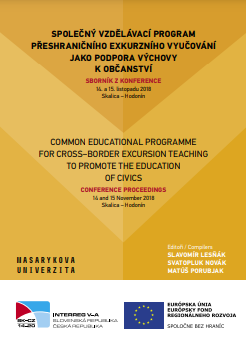Stopy T.G.Masaryka a jeho spolupracovníků na obou březích řeky Moravy
Traces of T. G. Masaryk and His Colleagues on Both Banks of the Morava River
Author(s): Erika Vonková
Subject(s): Political history, Social history, Recent History (1900 till today), Higher Education , History of Education
Published by: Masarykova univerzita nakladatelství
Keywords: T. G. Masaryk; Skalica; Hodonín; Pavel Blaho; Ludevít Šimek; Jan Herben; Emanuel Havelka;
Summary/Abstract: The first part of the paper is devoted to a consideration of what the secret of the extraordinary personality of T.G.M. as a poor boy who broke through consists in. The author offers an answer to the „Attempt at the Graphological Biography of T.G. Masaryk“ by Robert Saudek, published in Masaryk‘s Proceedings in 1927. The second part of the text highlights the relationship of T.G.M. to both banks of the Morava River during his childhood, specifying it on both the Moravian and Slovak sides. The third part is aimed at Masaryk‘s contacts with the natives at the time of his teaching at the University of Vienna and the University of Prague. The Vienna contacts are connected on the basis of cooperation between the Slovak academic association Tatran and the Czech academic association. The cooperation of T.G.M. with the future doctor in Senica Dr. Ludevít Šimek and young Skalička citizen Pavel Blaho is mentioned. The cooperation with Slovak students at the time of Masaryk‘s engagement at the Czech University of Prague is connected with their activities around „Detvan“ and „Čas.“ The fourth part is devoted to the cooperation of T.G.M. with Slovak friends from the close neighbourhood of the Morava River on the Slovak side during the preparation and start-up of „Hlas“. The Moravian side of the Morava River in the matter of contacts with T.G.M. is represented by a native of Brumovice, the so-called creator of the Masaryk legend – editor of the magazine Čas, politician, journalist, writer and historian, Jan Herben, who spent almost all his life assisting Masaryk and his ideas. The text will also recall the important personality of Hodonín – Emanuel Havelka, who led five dialogues with Masaryk between 1904–1910, especially about religion, philosophy and education.
- Page Range: 68-79
- Page Count: 12
- Publication Year: 2019
- Language: Czech
- Content File-PDF

